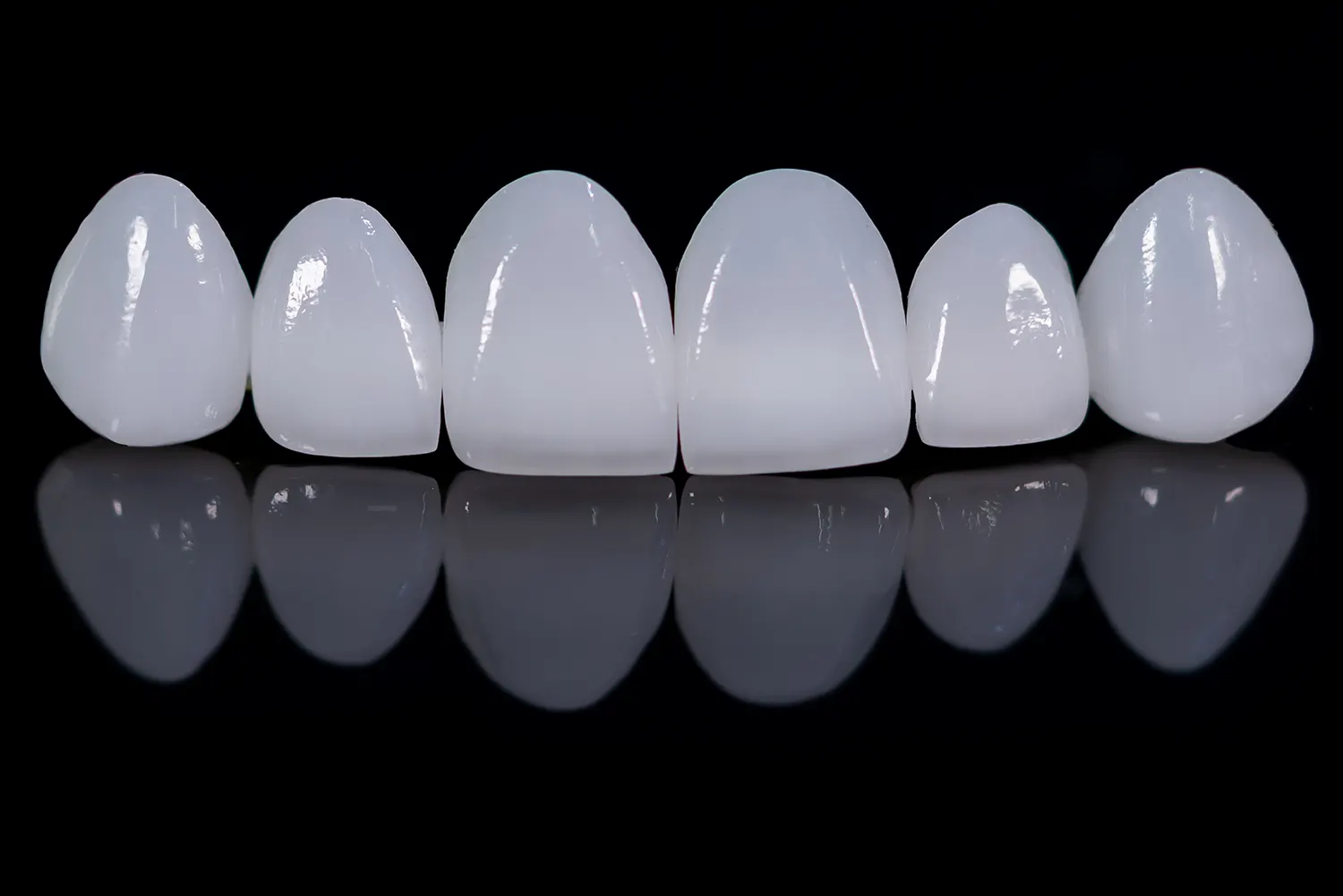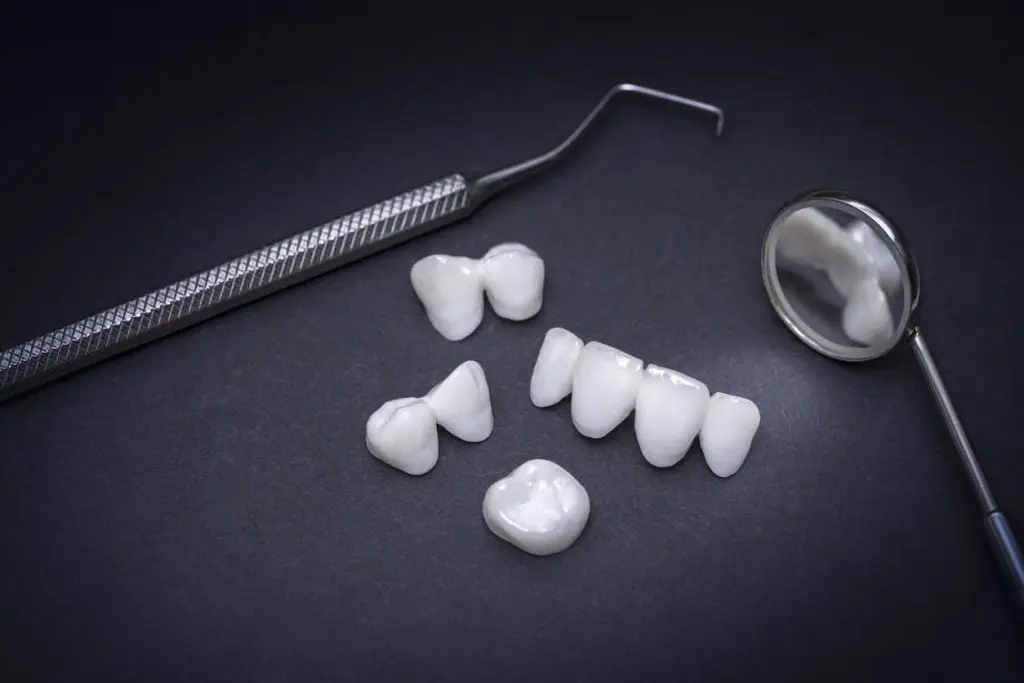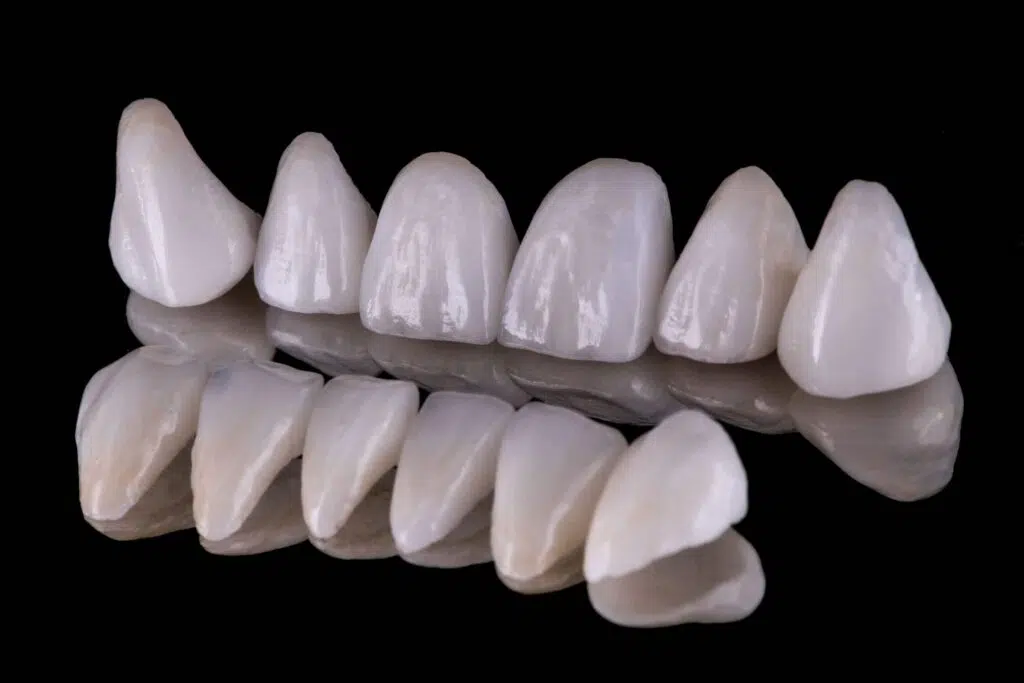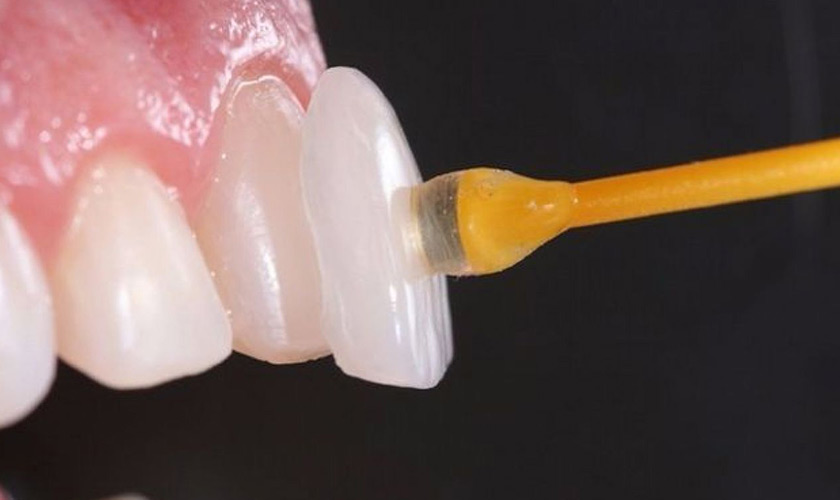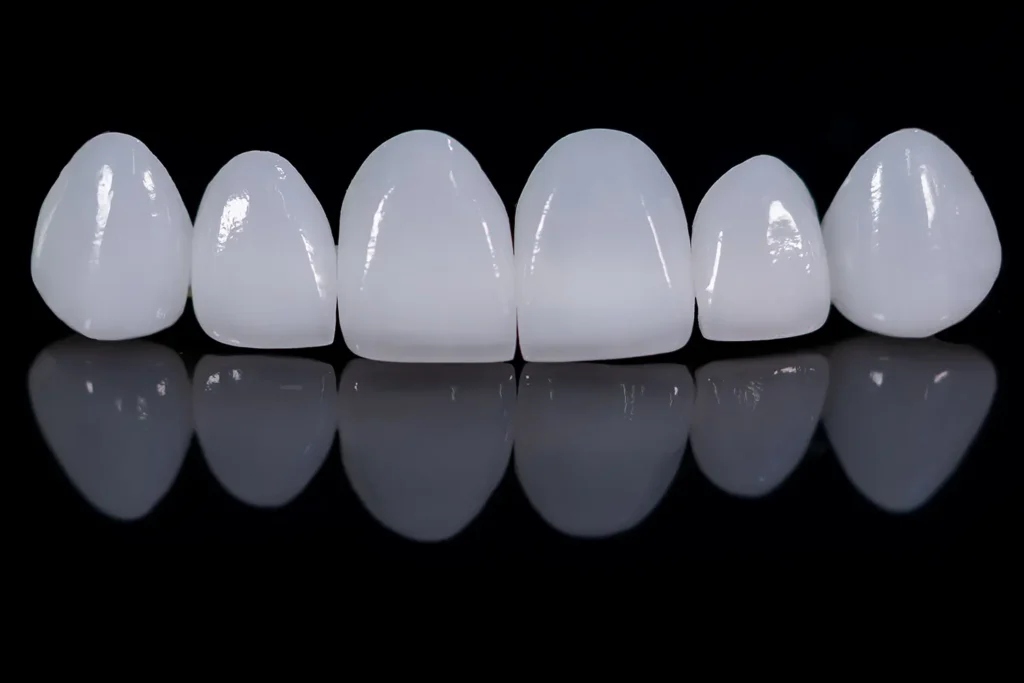
The porcelain veneer lifespan averages 10-15 years, with exceptional cases lasting up to 20 years when properly maintained. The longevity of dental veneers depends on three key factors: your dentist’s expertise, the quality of materials used, and your maintenance routine. To protect your investment, proper oral hygiene, avoiding hard foods, and regular dental visits are essential.
While porcelain veneers are remarkably durable, they may require replacement after 10-15 years due to natural gum changes or material wear, not because of complete failure. By following good habits (like using a nightguard for teeth grinding) and limiting stain-causing foods, you can maximize your porcelain veneer’s lifespan and enjoy your beautiful smile for years to come.
Today, we’ll explore the porcelain veneer lifespan together, uncovering both their typical longevity and the key factors that determine how long your beautiful, natural-looking results will endure.
The Lifespan of Porcelain Veneers
The porcelain veneer lifespan typically ranges from 10-15 years, though with proper care and maintenance, these restorations can continue serving you effectively for up to 20 years while maintaining their aesthetic appeal and functionality. Their longevity depends on three key factors: your dentist’s expertise, the quality of materials used, and the laboratory’s craftsmanship. However, your daily care routine is equally important. Regular brushing with a soft toothbrush, using proper flossing techniques, and avoiding damaging habits like teeth grinding or chewing hard objects will help maximize your veneers’ lifespan and maintain their natural appearance for years to come.
To maximize your porcelain veneer lifespan at D’Amico Dental Care, we recommend bi-annual dental check-ups and professional cleanings to prevent margin stains while advising against stain-causing habits like coffee/tea consumption and smoking, which can compromise longevity. Protective measures like custom night guards (for teeth grinding) and mouthguards (for contact sports) are essential. When considering how long do veneers last, it’s important to note that most replacements result from marginal issues rather than complete failure, highlighting why proper gum health maintenance becomes absolutely crucial for maximizing their longevity. With proper care at our Watertown or Wayland locations, your veneers can maintain their beauty and function for years beyond their typical lifespan.
What Affects the Longevity of Veneers?
The porcelain veneer lifespan typically ranges from 10-15 years compared to composite veneers’ 5-7 years, though proper care can extend durability by up to 30%, making regular dental exams essential for early detection of potential issues and maximizing your investment. The longevity of veneers depends on both technical and behavioral factors:
Technical Factors:
✓ Dentist’s precision in tooth preparation
✓ Veneer material quality (porcelain vs composite)
✓ Bonding technique accuracy
✓ Marginal adaptation to the tooth
Behavioral Factors:
✓ Oral hygiene (brushing/flossing)
✓ Nightguard use for teeth grinding
✓ Avoiding hard foods (ice/nuts)
✓ Limiting stain-causing substances (coffee/tea/tobacco)
Individual Factors:
✓ Initial tooth/gum condition
✓ Personal habits (nail biting, pen chewing)
✓ Regular dental check-ups (every 6 months)
The Critical Role of Bonding Technique
The porcelain veneer lifespan is significantly influenced by the bonding process quality, as the veneers’ adhesion strength remains one of the most decisive factors determining their long-term durability and performance. This sensitive procedure involves three critical stages: precise tooth surface etching with acid, standardized adhesive application, and controlled-pressure veneer placement. Any errors in these steps – like insufficient etching, saliva contamination, or incomplete polymerization – can significantly reduce a veneer’s lifespan.
Faulty bonding leads to serious complications like bacterial infiltration, adhesive failure, and marginal discoloration. To prevent these issues, dentists must follow standardized protocols, use proper equipment (e.g., high-power polymerization devices), and meticulously monitor each step. Adhering to these principles can improve the longevity of veneers by up to 30%.
“ The adhesive porcelain veneer complex has been proven to be a very strong complex in vitro and in vivo. An optimal bonded restoration was achieved, especially if the preparation was located completely in enamel, if correct adhesive treatment procedures were carried out, and if a suitable luting composite was selected. The maintenance of the aesthetics of porcelain veneers in the medium to long term was excellent, patient satisfaction was high, and porcelain veneers had no adverse effects on gingival health in patients with optimal oral hygiene. “ pubmed.ncbi.nlm.nih.gov
How Marginal Fit Impacts Veneer Lifespan
Achieving perfect marginal adaptation between the veneer and tooth is crucial for long-term success. The ideal gap should be under 100 microns – larger spaces allow bacterial infiltration and secondary decay. Modern digital technologies like CAD/CAM and microscopic evaluation now enable exceptionally precise margins that directly enhance the longevity of dental veneers by improving fit and reducing microleakage risks.
Improper adaptation leads to plaque accumulation, discoloration, and eventual treatment failure beyond just cavities. Dentists must meticulously polish margins post-placement and utilize advanced imaging to verify quality. Studies prove optimal marginal fit can boost porcelain veneer lifespan by up to 40%, making this technical detail a game-changer for durability.
Oral Hygiene
The porcelain veneer lifespan is heavily influenced by proper oral hygiene, which stands as the most critical patient-controlled factor, with research showing that poor hygiene practices can reduce longevity by up to 50% compared to well-maintained veneers. The three pillars of veneer care include:
✓ Brushing with non-abrasive toothpaste
✓ Using specialty floss (like super floss) for marginal cleaning
✓ Daily rinsing with alcohol-free antibacterial mouthwash
These practices prevent plaque buildup and secondary decay at the veneer-tooth junction.
Beyond routine care, patients should:
• Get professional cleanings/exams every 6 months
• Use soft electric toothbrushes for better plaque removal
• Limit stain-causing substances (coffee/tea/tobacco)
Studies confirm that patients following this protocol maintain their veneers 10-15 years on average without complications.
The Critical Role of Night Guards
For patients with bruxism (teeth grinding), wearing a night guard is essential to protect dental veneers. When evaluating how long do veneers last, these custom-made oral appliances play a vital role in absorbing and distributing destructive forces to prevent mechanical damage and significantly extend the lifespan of your veneers. An effective night guard should be made of medical-grade silicone with proper thickness (2-3mm minimum) and provide full tooth coverage. Studies show regular use can reduce veneer damage by up to 70%, significantly impacting the longevity of dental veneers.
To ensure optimal protection:
✓ Wear nightly – even when no grinding symptoms are present
✓ Clean daily with specialized solutions
✓ Get professional evaluations every 6 months
✓ Replace annually or if significant wear occurs
Statistics reveal these practices can extend porcelain veneer lifespan by 40% in bruxism patients and prevent most premature failures.
Regular Dental Visits: The Secret to Maximizing Your Veneers’ Longevity
Scheduling dental check-ups every six months is crucial for maintaining both your oral health and the longevity of veneers. During these visits, your dentist will carefully examine your veneers for micro-cracks, bacterial infiltration at the gumline, and bonding integrity. Professional cleanings prevent plaque buildup that could damage your veneers. Research confirms that the porcelain veneer lifespan can be extended by up to 40% with 60% fewer complications when patients maintain regular dental visits, highlighting the critical role of professional care in preserving your investment.
Each visit includes a comprehensive evaluation of not just your veneers, but your overall oral health, assessing gum condition, tooth contacts, and potential decay. Your dentist may polish veneer surfaces to maintain their shine and check your bite alignment to prevent excessive pressure. These preventive measures protect your investment while avoiding future complications and costly treatments.
Average Lifespan of Veneers
Composite Veneers:
- Average lifespan: 5-7 years
- Maximum lifespan with excellent care: up to 10 years
- Common issues: Surface wear, discoloration, marginal fractures
Porcelain Veneers (Laminates):
- Average lifespan: 10-15 years
- Maximum lifespan with excellent care: up to 20 years
- Common issues: Micro-cracks, bonding failures
Key Longevity Factors:
✓ Initial application quality (50% impact)
✓ Oral hygiene maintenance (30% impact)
✓ Personal habits (20% impact)
porcelain veneer lifespan Extension Tips:
✔ Use soft-bristled toothbrushes and specialized floss
✔ Avoid chewing hard substances
✔ Wear a night guard for bruxism
✔ Schedule biannual dental check-ups
✔ Get professional veneer polishing
| Parameter | Composite Veneers | Porcelain Veneers | Clinical Notes |
| Average Lifespan | 5-7 years | 10-15 years | • 2-3x longer for porcelain |
| Max Lifespan | Up to 10 years (with optimal care) | Up to 20 years (rare cases) | Record: 22 years for zirconia-reinforced |
| Common Failures | • Surface wear (25-50μm/year) • Discoloration (ΔE>3 after 3 years) • Marginal fractures |
• Micro-cracks (5-15% cases) • Debonding (3-8% risk) • Secondary caries |
Composite fails 3x faster in bruxers |
| Critical Factors | |||
| • Application Quality | 50% impact (layer thickness <2mm ideal) | 50% impact (margin gap <100μm optimal) | CAD/CAM reduces human error by 40% |
| • Oral Hygiene | 30% impact (pH>5.5 prevents degradation) | 30% impact (prevents sub-surface stains) | Electric brushes increase longevity by 20% |
| • Habits | 20% impact (avoid tobacco/red wine) | 20% impact (no ice/pencil chewing) | Bruxism reduces lifespan by 30-50% |
| Pro Maintenance | |||
| • Tools | Microfiber brushes (e.g., Curaprox) Non-abrasive paste (RDA<50) |
Air-polishing (glycine powder) Diamond polishing paste |
Avoid ultrasonic scalers on composites. |
| • Professional Care | Touch-ups every 12-18 months | Integrity checks are performed every 2 years | Early bonding failure detection saves 80% |
Maximizing the Lifespan of Your Porcelain Veneers
At D’Amico Dental Care, we help patients achieve a porcelain veneer lifespan of 15-20 years—nearly double the industry average—through. The secret? A combination of gentle daily care and consistent professional attention. Use a soft-bristled toothbrush with non-abrasive toothpaste, clean carefully around the edges with veneer-specific floss, and rinse with alcohol-free mouthwash to protect both your veneers and gum health. Avoid using your veneers as tools, and limit stain-causing habits like coffee consumption or smoking to maintain their flawless appearance.
Even with perfect home care, professional maintenance is non-negotiable. Our Watertown and Wayland clinics recommend biannual check-ups for thorough cleanings and early detection of any potential issues. For patients who grind their teeth, we provide custom night guards to prevent unnecessary wear. Annual professional polishing at our practice helps maintain that “just-installed” shine while preventing 60% of premature replacements. These simple but crucial steps ensure your veneer investment stays beautiful and functional for decades.
Proper Care and Maintenance Tips
To maintain the beauty and longevity of dental veneers, follow these daily care essentials:
• Brush twice daily with a soft-bristled toothbrush and non-abrasive toothpaste
• Use superfloss daily to clean along the gumline
• Rinse with alcohol-free mouthwash after meals
• Limit stain-causing foods/drinks (coffee, tea, soda, tobacco)
• Avoid chewing hard items (ice, nuts, hard bread crusts)
Professional maintenance is equally crucial:
✓ Schedule bi-annual check-ups and cleanings
✓ Wear a night guard if you grind your teeth
✓ Get annual professional polishing
✓ Repair minor chips/cracks immediately
Pro Tips:
- Never use teeth as tools
- Wear a mouthguard during contact sports
- Limit acidic foods/drinks
- Report any changes to your dentist promptly
Following these simple steps can significantly extend your porcelain veneer lifespan up to 20 years while preventing premature replacement costs and maintaining optimal aesthetic results.
Avoiding Habits That Can Damage Veneers
While porcelain veneers are durable, certain habits can significantly damage them. Chewing hard substances like ice, nuts, or hard bread crusts may cause chips or cracks in veneers. Using your teeth as tools to open bottles or packages also puts excessive pressure on them. Regular consumption of staining agents like coffee, tea, and cigarettes gradually discolors veneer edges. Even nighttime teeth grinding (bruxism) without a protective guard can slowly damage your veneers over time.
To maximize your porcelain veneer lifespan, always chew tough foods with your back teeth and avoid biting extremely hard objects, as these protective habits significantly reduce the risk of chipping or premature wear. Break habits like nail-biting or chewing on pens. Wear a mouthguard during contact sports and limit stain-causing foods – rinsing your mouth after consuming them. Most importantly, use a nightguard if you grind your teeth. By following these simple precautions, you can enjoy your veneers for many years while maintaining their appearance and function.
When to Replace Porcelain Veneers
At D’Amico Dental Care (serving Watertown & Wayland), we help patients recognize the key signs that their porcelain veneers may need replacement. While the porcelain veneer lifespan typically ranges from 10-15 years, watch for these warning signals:
✔ Visible damage (cracks, chips, or rough edges)
✔ Stubborn stains that won’t polish away
✔ Gum recession exposing the root base
✔ Loose fit or food trapping around edges
✔ Worn surfaces affecting your bite
When determining how long do veneers last, common culprits like teeth grinding, dental trauma, or changing bite alignment can accelerate wear and potentially reduce their lifespan by up to 50% without proper intervention That’s why our Watertown and Wayland patients receive:
→ Annual aesthetic checkups to spot early issues
→ Custom night guards for bruxism protection
→ Bite analysis to prevent premature wear
source: pubmed
FAQ
- How long do porcelain veneers typically last?
- Average lifespan: 10 to 15 years with proper care
- Recorded cases: Some last up to 20 years
- Factors reducing lifespan: Teeth grinding, poor oral hygiene, trauma
- What factors influence veneer longevity?
- Quality of application: Dentist’s skill (60% impact)
- Materials used: Grade of porcelain and special adhesive
- Home care: Daily oral hygiene maintenance
- Personal habits: Ice chewing, nail biting, pencil chewing
- Base tooth health: Presence of decay or gum disease
- Do porcelain veneers last longer than composite or laminates?
- Composite veneers: 5-7 years (less than porcelain)
- Ceramic laminates: 8-12 years (similar to porcelain)
- All-ceramic crowns: 10-15 years (comparable to porcelain)
- Porcelain veneers: Most resistant to wear and discoloration
- How can I tell if my veneers need replacement?
- Visible cracks or fractures
- Loose veneer
- Discoloration at edges (from pigment penetration)
- Gum recession around veneer
- Tooth sensitivity to hot/cold
- Decay in the underlying tooth
- How can I make my veneers last longer?
- Night guard: If you grind your teeth
- Soft toothbrush: With non-abrasive toothpaste
- Daily flossing: Using proper technique
- Avoid: Ice chewing, hard candy, nail biting
- Regular checkups: Every 6 months with the dentist
- Professional cleaning: 1-2 times yearly
- What’s the success rate of porcelain veneers?
- 10-year studies: 90-95% success rate
- Failure rate: Less than 5% in early years
- Failure causes: 80% due to secondary decay
- Patient satisfaction: Over 93% in studies
- What factors affect the replacement of old veneers?
- Need for base tooth restoration
- Changing the number of veneers
- Advancements in material technology
- Dentist’s expertise
- Potential discounts: For multiple unit replacements

